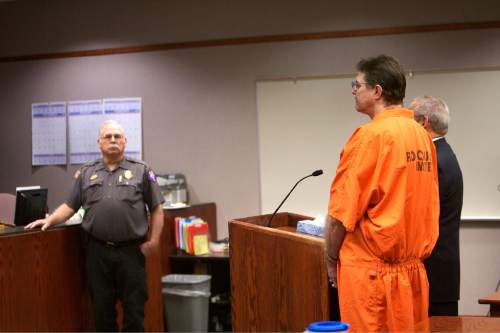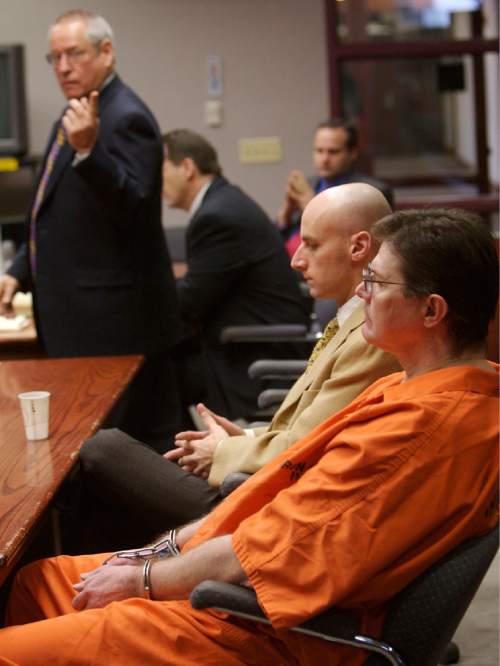This is an archived article that was published on sltrib.com in 2015, and information in the article may be outdated. It is provided only for personal research purposes and may not be reprinted.
The Utah Supreme Court has upheld the double murder conviction of a Beryl man who claimed he shot each victim eight times in self-defense during a fight over drugs.
In a 5-0 decision handed down Friday, the court rejected claims by Martin Chris Nelson — who is serving two life terms without the possibility of parole — that his trial attorneys were ineffective.
Court documents say the two victims — Chad Grijalva and Derek Davis, both 34 — traveled from St. George to Nelson's trailer in rural Iron County on Oct. 24, 2007, to pick up some methamphetamine.
Nelson was angry at Grijalva, whom he said owed him for some psychedelic mushrooms, and suspicious of Davis, whom he had been told by a friend was a "snitch," court records say.
Nelson, now 51, testified at trial that Grijalva was upset by the small amount of meth that Nelson had for him, so Nelson brought out some of his own stash as a peace offering and the trio began to get high. Nelson said he became angry when Grijalva was handed the pipe and claimed it was empty because that is a common way meth heads steal drugs in a group.
When he got up to put away the drugs, Davis and Grijalva attacked him, so he grabbed his .22-caliber, lever-action riffle and began shooting, according to Nelson. Each man was hit by eight bullets, including an immediately incapacitating shot to the side of each victim's head.
After the shooting, Nelson dumped the bodies in a nearby hole he had been digging for a septic tank, tore up and disposed of the carpet in the trailer, and began dismantling Davis' pickup truck after learning authorities were looking for it, court documents say.
About three weeks later, Iron County Sheriff Mark Gower went to Nelson's trailer to arrest him for failure to register as a sex offender and noticed a partially dismantled truck in a makeshift garage during a protective sweep that appeared to match Davis' missing vehicle. Nelson, who was brought in for questioning, lied and said Grijalva never showed up. Armed with a search warrant and using cadaver dogs, deputies discovered the bodies in a shallow grave.
Nelson was charged with two counts of aggravated murder and one count of theft by receiving a stolen motor vehicle. His lawyers argued self-defense, but he was convicted of all three crimes.
In his appeal, Nelson claimed his trial counsel provided ineffective assistance by, among other actions, re-enacting his version of the shooting in an improper manner and by introducing evidence that he was on probation at the time of the killings. The Supreme Court was unpersuaded.
Writing for the court, Justice Deno Himonas said lawyers regularly have to make quick strategic decisions. The two defense attorneys, who acted the parts of the victims while Nelson laid on the floor with the gun in his hand, "could have reasonably strategized that the demonstration would show the jury that Mr. Nelson's story could be reconciled with the physical evidence," the justice wrote.
As for the admission that Nelson was on probation, Himonas wrote, the defense needed a plausible explanation for why Nelson admittedly lied when he was interviewed after the men's disappearance.
"It was critical to explain to the jury why, after shooting each man eight times, Mr. Nelson would deposit the victims' bodies in a shallow hole; cover them with several layers of dirt, trash, and human waste; rip up and burn the bloody carpet; repaint the trailer floor; dismantle the truck the victims arrived in; and then lie about it to investigators, acquaintances, and family," the ruling said.
Attorney General Sean Reyes applauded the decision, saying, "This case demonstrates the Attorney General Office's continued commitment to protecting the rights of victims and their families — and ensuring justice is served in Utah criminal cases."
Twitter: @PamelaMansonSLC





